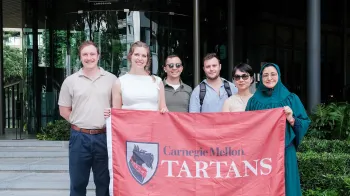Tepper School of Business at Carnegie Mellon University
Data-Informed. Human-Driven.
We are the Tepper School of Business, where human intelligence unlocks the power of data. As part of Carnegie Mellon University, we're uniquely positioned at the intersection of business, technology and human creativity to tackle modern challenges.
Our approach goes beyond a traditional business education. We empower you to harness artificial intelligence (AI) and other advanced tools through experimental, hands-on learning. At the same time, you build ethical and equitable leadership skills to help your team and company grow.
Be part of the Tepper School’s efforts to build The Intelligent Future℠, where human creativity and innovation converge to address global challenges and drive positive change in business and society.
Academic Programs at the Tepper School
Your academic experience at the Tepper School of Business is built on a balance of analytical rigor, leadership development, and flexibility. No matter which path you choose, you’ll find a curriculum that prepares you to lead with confidence and adapt to change.

Research and Thought Leadership
Faculty at the Tepper School shape global conversations in economics, finance, operations, and leadership, with growing impact in artificial intelligence. Through faculty research and Tepperspectives, their insights connect academic discovery to the real challenges facing business and society.








